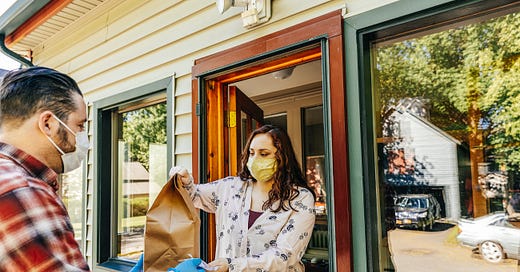DoorDashing Down Backroads in Appalachian Kentucky
"Country folks are better tippers than city folks. They are more gracious about late deliveries. Just all around nicer."
Mention DoorDash—the well-known and contentious online food delivery platform—and most people envision a lean twentysomething person whizzing through city streets on a bicycle, nimbly dodging cars and throngs of people to bring an apartment-dweller their soup dumplings or overstuffed burrito.
The pandemic reality, though, is that the reach of DoorDash, GrubHub and Uber Eats now stretches far beyond urban centers, bringing with it a very different set of issues and concerns for their delivery drivers in rural communities and small towns. These “Dashers” in Appalachian Kentucky and beyond face longer delivery times due to poorly maintained backroads and countryside distances, but still operate under the same pressure-packed “time is money” mantra as their metropolitan peers.
Below, DoorDasher Jane McClure of Rockcastle County describes what it’s like to “Dash” up mountainsides and into hollers in our region—and how country folks are better tippers than their small-town-dwelling counterparts.
Jane McClure: DoorDasher, Rockcastle County
During this pandemic, thousands of people searched for ways to supplement—or even replace—our income. Working for DoorDash, GrubHub and Instacart was the answer for many of us.
I chose DoorDash because it is by far the most used delivery service in my area. It gave me more opportunities. While food delivery is about 90 percent of my work, I deliver not only from restaurants, but from department stores and pharmacies. I deliver to many offices, hospitals, schools and small businesses. The most appealing thing to me is the flexible work schedule. I can work as much or as little as I want, when I want.
I always thought of delivery as guys on bikes in big cities zipping through traffic with delivery bags on their backs, but the pandemic changed everything. It affected urban and rural alike. We couldn't go out in public, but we still needed our stuff. Businesses struggled with how to get their products to customers.
Now we have delivery drivers like me traveling the backroads—we pick up orders in town and drive out into the countryside. I’ve met DoorDashers from ages 18 to 80. High school seniors earning extra cash while schools were closed. School teachers working through the summer. Retired folks supplementing their incomes. Hardcore Dashers working twelve-hour days. And everything in-between. There is no such thing as a “typical Dasher” here.
Delivery out in the country is a little different. Sometimes, I have to drive five miles or more to complete a delivery. This makes my expenses higher than a city Dasher, but my job takes me on scenic country roads with almost no traffic. It’s all rush, rush, rush in town, then driving out in the countryside to deliver to customers. I have worked in a larger town of 30,000 people, but I much prefer to work in the smaller towns. In my experience, country folks are better tippers than city folks. They are more gracious about late deliveries. Just all around nicer. It makes for a better work experience.
Taxes and fuel costs take a big bite out of my earnings. I am considered self-employed, so my taxes are doubled. I see Dashing as a fun way to make some “mad money.” Most Dashers I have met are Dashing to supplement their income, or as something fun to do. The only person I have met who was Dashing for his primary income, Dave, said, “I work twelve hours a day, six days a week, and make about eight hundred a week.” That's $11 per hour, before taxes, and 72 hours per week. Most Dashers I’ve met work far less than that.
Most places are dealing with staffing shortages nowadays, and people are working right through their breaks. Food delivery provides them with a fresh meal without leaving work. Some restaurants make us Dashers go through the drive-thru line with everyone else. That old saying “time is money” was never truer than for delivery drivers. I could miss two or more delivery opportunities while sitting in line. I won't do it anymore.
I remember one time I accepted an order and had to go through the drive thru. There were six cars ahead of me. I didn't think too much of that until twenty minutes later when there were still four cars ahead of me. A curb on both sides prevented me from pulling out of line, otherwise I would have. I sat in line for forty-five minutes waiting for this guy's order. (Mind you, I was texting him and keeping him updated on the progress of his order the whole time.) I finally got his food and rushed to deliver it—thirty-five minutes late. He gave me a 1-star review, even though I did everything within my power to deliver his food quickly.
Another reason an order might take a while is because the customer chooses not to pay a tip. I understand that ordering through DoorDash is not cheap with the fees. But the driver earns about $2.50 to $3.50 (without that tip) to spend 15-20 minutes waiting and driving to deliver the order. For drivers going out to the country, that is certainly not worth the trip. That no-tip order will cycle through all available drivers until someone accepts it. If no one accepts it, then DoorDash will offer 25-50 cents more and cycle it through again. This process repeats until someone accepts the order. My advice to people when they ask me how they can get their orders faster is pay better tips. I know it sounds harsh, but if you can't afford to pay a decent tip, don't order DoorDash.
I meet some interesting people on my job. I delivered to a man dressed like the Mad Hatter, Charles, who was also a DoorDash driver and gave me some free tips. His best advice, “Stay in constant communication with the customer, and ask for a 5-star rating.” I delivered to a guy who was on house arrest and wearing an ankle monitor. He lived on the third floor and apologized for not being able to meet me out front. That’s why I love working in rural communities. I delivered to a very sweet little elderly lady whose instructions said “knock on door”—which I did. She popped out and proceeded to tell me her whole life story and what she was fixing for supper. I felt sorry for her, because I'm sure she was lonely. On subsequent deliveries to her, though, I knocked and ran. Like I said, time is money.
The next time you order DoorDash and it takes forever to get to you, please don't blame your delivery person. Trust me, we are moving as fast as we can because a quick delivery benefits us as much as it does you. Show a little grace to the workers out there that are doing the job of several people. They're doing their best.





